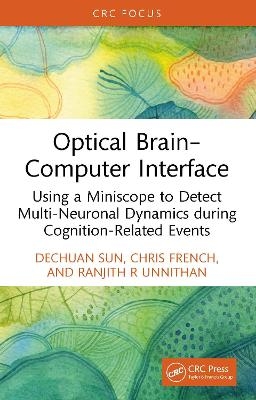
Optical Brain–Computer Interface
CRC Press (Verlag)
978-1-032-74680-7 (ISBN)
In this shortform book, Sun, French, and Unnithan explore state- of- the- art optical recording techniques, with a focus on the revolutionary miniaturized fluorescence microscope – the miniscope – for real- time and in vivo monitoring of multi- neuronal dynamics during cognition- related events.
The miniscope is a powerful tool that allows real- time in vivo optical recording of multi- neuronal activity in freely moving animals. This book highlights the use of the miniscope in the context of the hippocampus, a brain region crucial for memory and cognition. The authors employ a combination of theoretical concepts, practical applications, and illustrative case studies to deliver a comprehensive understanding of optical recording techniques. They provide step- by- step guides for using the miniscope, offer insights into data analysis, and discuss its implications in the context of hippocampal research and brain– computer interfaces. Readers will gain profound insights into the role of the hippocampus in memory and cognition, and expert knowledge of the latest miniaturized in vivo optical recording techniques. The book provides them with thorough guidance on implementing a miniaturized fluorescence microscope for a brain– computer interface and information on advanced analysis techniques on the activity of large neuronal populations.
This book provides an invaluable short and accessible guide for researchers, neuroscientists, and brain– computer interface enthusiasts to enable them to understand and leverage the immense potential of this advanced optical recording methodology.
Dechuan Sun is a postdoctoral research fellow in the Department of Electrical and Electronic Engineering at The University of Melbourne. Chris French leads the Neural Dynamics Laboratory at the Melbourne Brain Centre, is an Associate Professor in the Department of Medicine at The University of Melbourne and neurologist at the Royal Melbourne Hospital. He attained his PhD from the University of New South Wales and MD from the University of Sydney. He is a fellow of the Royal Australasian College of Physicians and a member of the Board of Directors of the Organisation for Computational Neuroscience (OCNS). Ranjith R Unnithan is an associate professor in the Department of Electrical and Electronic Engineering at The University of Melbourne. He received his PhD in Electrical Engineering from the University of Cambridge. He is a member of IEEE, The International Society for Optics and Photonics, and the Australian Optical Society.
1. General Overview and Introduction
2. Optical Manipulation Procedures
3. Scopolamine Impairs Spatial Information Recorded with “Miniscope” Calcium Imaging in Hippocampal Place Cells
4. Hippocampal Cognitive and Relational Map Paradigms Explored by Multisensory Encoding Recording with Widefield Calcium Imaging
5. Real-Time Multimodal Sensory Detection Using Widefield Hippocampal Calcium Imaging
6. Conclusions and Future Work
| Erscheinungsdatum | 25.09.2024 |
|---|---|
| Zusatzinfo | 3 Tables, black and white; 30 Line drawings, black and white; 3 Halftones, black and white; 33 Illustrations, black and white |
| Verlagsort | London |
| Sprache | englisch |
| Maße | 138 x 216 mm |
| Gewicht | 376 g |
| Themenwelt | Naturwissenschaften ► Biologie ► Humanbiologie |
| Naturwissenschaften ► Biologie ► Zoologie | |
| Technik ► Umwelttechnik / Biotechnologie | |
| ISBN-10 | 1-032-74680-7 / 1032746807 |
| ISBN-13 | 978-1-032-74680-7 / 9781032746807 |
| Zustand | Neuware |
| Informationen gemäß Produktsicherheitsverordnung (GPSR) | |
| Haben Sie eine Frage zum Produkt? |
aus dem Bereich


